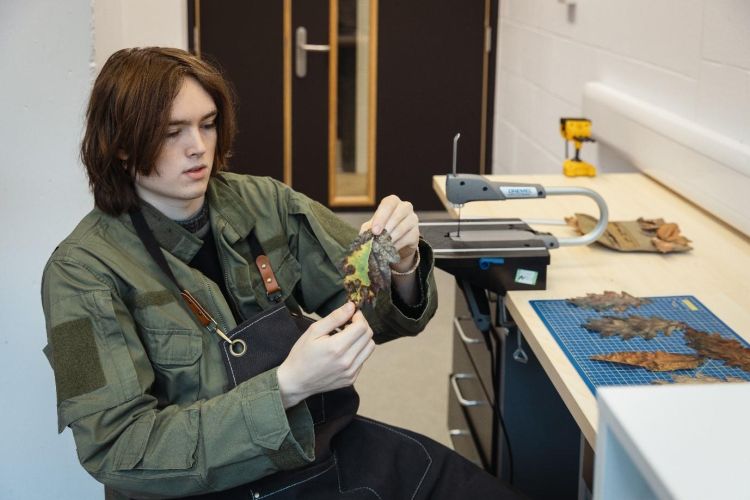
Alex Neish
- Course: BA Fine Art with History of Art
Alex Neish, talks about the enterprise opportunities he discovered through the HELIX student innovation space. He secured a Spark scholarship and gained invaluable mentorship from an Enterprise Ambassador to develop his business plan.
Alex initially chose to study History of Art at the University of Leeds, but changed his course when he discovered the virtual reality facilities the university had to offer.
“I’m an artist and a filmmaker and I’m really interested in virtual reality,” he explains. “I changed my course to Fine Art with History of Art so I could explore my interests in more depth, and took over running the Extended Reality (XR) Society at the university.”
“At the same time, the university launched HELIX: a new digital education and student innovation space. It has 80 headsets and one of only six of the UK’s and Omnideck VR treadmills. I was lucky enough to secure an internship at HELIX, through which I introduce other students to XR technologies and the makerspace workshop. It is at HELIX where I was introduced to members of the Centre for Enterprise and Entrepreneurship Studies and Spark teams.”

Securing Spark scholarship to support a business start-up
Alex started attending Spark workshops at HELIX. “Spark shared information about their scholarships, so I decided to apply,” Alex says. “I was successful, and gained a great overview about how to start a business – as well as invaluable introductions to local entrepreneurial mentors.”
It was here that Alex was introduced to Enterprise Ambassador Jonathan Straight. “Jonathan was running drop-in sessions at HELIX, where his door was open for students to ask him about any business concerns or ideas,” Alex says. “He’s been a brilliant business mentor, and gave me incredible advice about my business plan for my company, Chameleon Concealment: a digital business. I take photos of leaves, which are laser cut and used, for example, on paintballing clothing.”
Mentoring
One of the biggest challenges Alex has faced is moving beyond the amazing prototyping facilities at HELIX to sourcing and working with the correct factory to produce the leaf laser cut outs and provide fabric printing. Yet he found talking these concerns through with Jonathan invaluable. “Jonathan advised me to change my business plan slightly so I could save money as a start-up and avoid taking out a business loan,” Alex explains. “He showed me how to reduce risk by removing some parts of my offer to significantly cut direct costs, without compromising on my overall vision.”
After taking Jonathan’s advice, Alex decided to enter his idea into a business competition. “I came third in the competition I entered,” Alex says. “Yet I also won an incredible prize: the Nick Howard Award. Nick was one of the competition judges, and personally chose an entry to award additional funding. Its’s given me the money I need to launch my business when my final product is ready.”
Gaining new skills
Alex plans to secure a graduate job and run Chameleon Concealment alongside it. Yet he wants to continuing working at the university for another year, using HELIX as a space for personal and academic projects.
“The most valuable thing I’ve gained from my time in enterprise is independence,” Alex concludes. “When you’re a founder or a small business creator you’re often working alone, so you need to be incredibly resourceful. Through enterprise at the University of Leeds, I’ve learnt so many new business skills that have already proven invaluable. I wouldn’t have this knowledge and experience without my time in enterprise.”
Read about undergraduate courses at the School of Fine Art, History of Art and Cultural Studies

